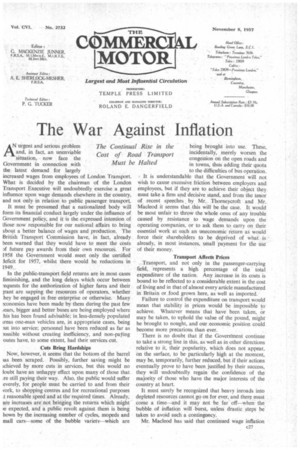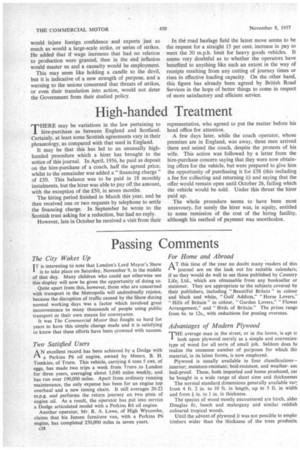The War Against Inflation
Page 77

Page 78

If you've noticed an error in this article please click here to report it so we can fix it.
ANurgent and serious problem and, in fact, an unenviable situation, now face the Government in connection with the latest demand for largely increased wages from employees of London Transport. What is decided by the chairman of the London Transport Executive will undoubtedly exercise a great influence upon wage demands elsewhere in the country. and not only in relation to public passenger transport.
It must be presumed that a nationalized body will form its financial conduct largely 'under the influence of Government policy, and it is the expressed intention of those now responsible for our national affairs to bring lbout a better balance of wages and production. The British Transport Commission have, in fact, already been warned that they would have to meet the costs )f future pay awards from their own resources. For 1958 the Government would meet only the certified leficit for 1957, whilst there would be reductions in I949.
In the public-transport field returns are in most cases liminishing, and the long delays which occur between .equests for the authorization of higher fares and their ;rant are sapping the resources of operators, whether hey be engaged in free enterprise or otherwise. Many Tonomies have been made by them during the past few /ears, bigger and better buses are being employed where his has been found advisable; in less-densely populated Lreas one-man vehicles are, in appropriate cases, being )ut into service; personnel have been reduced as far as *ssible without creating inefficiency, and non-Wing Pules have, to some extent, had their services cut.
Cuts Bring Hardships Now, however, it seems that the bottom of the barrel las been scraped. Possibly, further saving might be ichieved by more cuts in services, but this would no loubt have an unhappy effect upon many of those that .re still paying their way. Also, the public would suffer everely, for people must be carried to and from their vork, to shopping centres and for recreational purposes .t reasonable speed and at the required times. Already, are increases are not bringing the returns which might ■ e expected, and a public revolt against them is being hown by the increasing number of cycles, mopeds and mall cars—some of the bubble variety—which are The Continual Rise in the being brought into use. These, incidentally, merely worsen the congestion on the open roads and in towns, thus adding their quota to the difficulties of bus operation. , It is understandable that the Governmentwill not wish to cause excessive friction between employers and employees, but if they are to achieve their object they must take a firm and decisive stand, and from the tenor of recent speeches, by Mr. Thorneycroft and Mr. Macleod it seems that this will be the case. It would be most unfair to throw the whole onus of any trouble caused by resistance to wage demands upon the operating companies, or to ask them to carry on their essential work at such an uneconomic return as would force their shareholders to be deprived of what is already, in most instances, small payment for the use of their money.
Transport Affects Prices Transport, and not only in the passenger-carrying field, represents a high percentage of the total expenditure of the nation. Any increase in its costs is bound to be reflected to a considerable extent in the cost of living and in that of almost every article manufactured in Britain or food grown here, as well as imported.
Failure to control the expenditure on transport would mean that stability in prices would be impossible to achieve. Whatever means that have been taken, or may be taken, to uphold the value of the pound, might be brought to nought, and our economic position could become more precarious than ever.
There is no doubt that if the GovernMent continue to take a strong line in this, as well as in other directions relative to it, their popularity, which does not appear, on the surface, to be particularly high at the moment, may be, temporarily, further reduced, but if their actions eventually prove to have been justified by their success, they will undoubtedly regain the confidence of the majority of those who have the major interests of the country at heart.
It must surely be recognized that heavy inroads into depleted resources cannot go on for ever, and there must come a time--and it may not be far off—when the bubble of inflation will burst, unless drastic steps be taken to avoid such a contingency.
Mr. Macleod has said that continued wage inflation would injure foreign confidence and exports just as much as would a large-scale strike, or series of strikes. He added that if wage increases that had no relation to production were granted, then in the end inflation would master us and a casualty would be employment.
This may seem like holding a candle to the devil, but it is indicative of a new strength of purpose, and a warning to the unions concerned that threats of strikes, or even their translation into action, would not deter the Government from their studied policy. In the road haulage field the latest move seems to be the request for a straight 15 per cent, increase in pay to meet the 30 m.p.h. limit for heavy goods vehicles. It seems very doubtful as to whether the operators have benefited to anything like such an extent in the way of receipts resulting from any cutting of journey times or rises in effective loading capacity. On the other hand, this figure has already been agreed by British Road Services in the hope of better things to come in respect of more satisfactory and efficient service.




























































































































































































































































